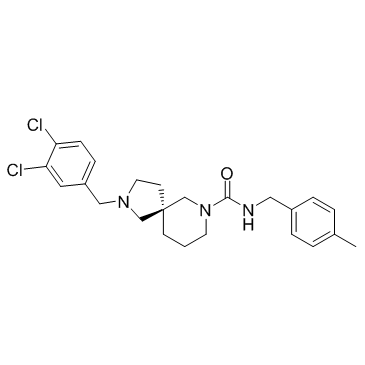| Description |
GSK2850163 is a novel inhibitor of inositol-requiring enzyme-1 alpha (IRE1α) which can inhibit IRE1α kinase activity and RNase activity with IC50s of 20 and 200 nM, respectively.
|
| Related Catalog |
|
| Target |
IC50: 20 nM (IRE1α kinase activity), 200 nM (IRE1α RNase activity)[1]
|
| In Vitro |
GSK2850163 is a novel inhibitor of inositol-requiring enzyme-1 alpha (IRE1α) which can inhibit IRE1α kinase activity and RNase activity with IC50s of 20 and 200 nM, respectively. The increased autophosphorylation of IRE1α could be reduced in a dose-dependent manner by GSK2850163. Increasing concentrations of GSK2850163 are capable of reducing the increased XBP 1 transcriptional activity. Two additional kinases are weakly inhibited by GSK2850163: Ron (IC50=4.4 μM) and FGFR1 V561M (IC50=17 μM)[1].
|
| Kinase Assay |
In the ADP-Glo assay, GSK2850163’s potency toward pIRE1α kinase activity is measured as its inhibition of an intrinsic, slowing ATP hydrolysis activity. One hundred nanoliters of dimethylsulfoxide solution of GSK2850163 at various concentrations is added into a 384-well plate. The reaction is carried out with 5 nM pIRE1α and 60 mM ATP in 10 mL of 50 mM Hepes buffer, pH 7.5, containing 30 mM NaCl, 10 mM MgCl2, 1 mM DTT, 0.02% Chaps, and 0.01 mg/mL bovine serum albumin. The reaction is stopped after 2 hours by adding 5 mL of ADP-Glo reagent I, which also depletes the remaining ATP. Following a 1-hour incubation, 5 mL of ADP-Glo reagent II is added into the reaction, which converts the ADP product into ATP to serve as the substrate for the coupled luciferin/luciferase reaction. After 30 minutes, the plate is read on a microplate imager[1].
|
| Cell Assay |
PANC-1 cells are seeded into six-well plates at a density of 5.0×103 cells/well in RPMI 1640 media containing 10% FBS. Cells are cotransfected with a pGL3-5x unfolded protein response element (UPRE)-luciferase reporter containing five repetitions of the XBP-1 DNA binding site and pRL-SV40 using the FuGENE6 transfection reagent. Forty-eight hours later, cells are treated with 2.5 mg/mL tunicamycin for 1 hour, followed by GSK2850163 treatment for 16 hours. Luciferase expression is measured using Dual-Glo Luciferase Assay kit and normalized to Renilla expression levels[1].
|
| References |
[1]. Nestor O. Concha, et al. Long-Range Inhibitor-Induced Conformational Regulation of Human IRE1α Endoribonuclease Activity. Molecular Pharmacology December 2015, 88 (6) 1011-1023.
|
